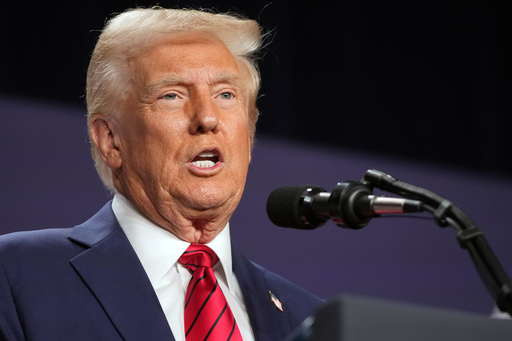WASHINGTON — Following the successful imposition of a 25% tariff on Colombia to manage deportees, President Donald Trump is now considering similar measures against Canada and Mexico as early as Saturday. However, the potential consequences are greater this time, and economists are expressing concerns about the significant economic damage such tariffs could inflict.
Matthew Martin, a senior economist at Oxford Economics, emphasized that the possibility of substantial economic repercussions should deter Trump from moving forward with these tariffs. “The potential for such sizable economic impacts ought to act as enough of a deterrent that Trump will not end up implementing these higher tariffs,” Martin stated.
Despite ongoing conversations aimed at addressing illegal border crossings and fentanyl smuggling, Trump has continued to assert that tariffs are imminent for both Canada and Mexico. His administration’s rationale extends beyond economic concerns, as Trump believes that tariffs would compel other countries to show greater respect for the U.S.
“We’re going to immediately install massive tariffs,” Trump declared in a recent speech, highlighting Colombia’s initial resistance to the threat of import taxes as a sign of strong-willed governance.
While tariffs pose risks, the Trump administration argues it is focused on broader economic outcomes. Several analyses indicate that tariffs imposed on Canada and Mexico could lead to increased inflation and a potential economic slowdown, in stark contrast to the relatively minor impact of the tariffs on Colombia, which represents around 0.5% of U.S. imports. In contrast, Canada and Mexico account for nearly 30% of total U.S. imports, raising the stakes significantly.
Kevin Hassett, the director of the White House National Economic Council, dismissed the economists’ concerns, claiming that their analyses fail to consider the entirety of Trump’s economic plans. “When the people who are trying to cause panic over President Trump’s trade policy simulate what it’s going to do, they don’t account for all the other policies,” Hassett asserted.
In response to Trump’s tariff threats, Mexican President Claudia Sheinbaum hinted at the possibility of retaliatory tariffs, yet has since opted for a more diplomatic approach, focusing on dialogue amid decreasing detentions at the U.S.-Mexico border. She noted that while drugs are a challenge for the U.S., Mexico has taken significant steps to combat the issue, including a major fentanyl seizure in recent months.
Sheinbaum expressed her support for the agreement between the Trump administration and Colombia, emphasizing the importance of maintaining respectful relations between nations.
Canadian officials have also indicated readiness to retaliate against any import taxes imposed by Trump, even as Foreign Minister Mélanie Joly emphasized ongoing efforts to prevent tariffs. Canada seems prepared to respond to whatever actions the U.S. president may take.
An analysis conducted by the insurance company Nationwide projected that Trump’s proposed tariffs on Canada and Mexico could lead to a 0.5 percentage point increase in inflation while reducing growth by 0.7 percentage points. This estimate does not account for any potential retaliatory tariffs from Canada or Mexico, which could exacerbate the negative effects on inflation and GDP growth.
With lower gasoline prices being central to Trump’s plan for addressing inflation, the implementation of tariffs on Canada may inadvertently raise fuel costs unless specific exemptions are included. Approximately 60% of oil and gas imports originate from Canada, and a 25% tariff could significantly increase gasoline and diesel prices, particularly impacting regions connected to Canadian refineries.
Research by PwC predicted that companies importing from Canada could face an additional $106 billion in annual import taxes, while those importing from Mexico could see a $131 billion increase. According to Chris Desmond of PwC, the transportation and automotive sectors are likely to be the hardest hit, given the extensive operations these sectors maintain in both countries.
Desmond forecasted that taxes from imports in the transportation sector due to Trump’s tariff policies could escalate from $4 billion to $68 billion annually. The methods through which companies might absorb or pass on these costs to consumers remain uncertain.
Despite the negative implications of the tariffs, Trump maintains that they will enhance U.S. wealth by granting protection from international competition and serve as a tool to address illegal immigration. “Tariffs, I told you, most beautiful word in the dictionary,” Trump remarked, reminiscing his campaign trail rhetoric that passionately endorsed import tariffs as a means to safeguard American interests.




